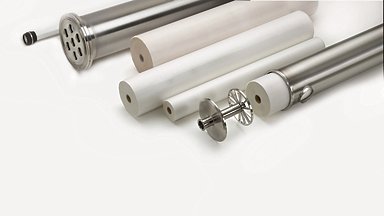Supporting cheese production
A variety of filtration technologies can be used with advantage in cheese production. Standardising total protein content in yellow cheeses is one of the major filtration applications as it evens out seasonal variations in milk protein content, stabilising the cheesemaking process. Bacteria and spore removal is another application which enhance cheese quality. Filtration also plays an important role in clarifying cheese brine, which is commonly used in cheese production for product preservation and texture control and to enhance flavour and optimise rind formation.
Uses

White cheese
High yield, uniform quality
White cheeses can be manufactured by fully concentrating milk using ultrafiltration. Culture or acid, rennet, salt and other additives are added to the filtration retentate. The finished cheese is then ready for packaging. The ultrafiltration process results in a high, uniform quality and a very high yield. At the same time, it is possible to manufacture several different products on the same ultrafiltration unit.

Cream cheese
Optimal product structure
In cream cheese production, fresh standardised milk is fermented and then concentrated by membrane filtration to create the right product composition. Ultrafiltration is a gentle concentration method that preserves the fat-to-protein ratio while removing only water, minerals and lactose. It delivers the optimal cream cheese structure. Ultrafiltration units are versatile and can manage multiple recipes – from low-fat to full-fat. They can also support different production capacities of these varieties. Ultrafiltration also gives a higher yield than the other concentration option – separation.

BrineClearTM
Cheese brine clarification
High quality brine is essential to cheese flavour, taste, rind and appearance. Poor quality brine jeopardizes cheese quality and can lead to product spoilage and financial loss. Over time, microorganisms like bacteria, spores, yeast and mould build up in the brine and can migrate to the cheese during the salting process, contaminating the cheese surface and degrading the product’s quality. The BrineClear uses membrane filtration to ensure high-quality brine at all times. The BrineClear process removes undesirable microorganisms, leaving clear brine. No additives are used and the brine’s temperature and pH remain unchanged throughout the filtration process. The BrineClear unit is easily connected to an existing brine system.

Protein standardisation of cheese milk
Lower costs, higher yield
Standardising total protein content in cheese milk evens out seasonal variations in milk protein content, stabilising the cheesemaking process and improving cheese vat utilization. Total protein standardisation also reduces rennet costs. This gives more control during the production process, reducing quality variation in the final product. Ultrafiltration is the technology used for standardising total protein. The process improves the control of curd-making properties and yields a high-quality whey stream.

Bacteria and spore removal in cheese
Ensuring high product quality
Traditionally, cheese’s natural content of spores, which survive normal pasteurisation, was controlled by adding nitrate to cheese milk. The nitrate prevents spores from growing and producing gas. In many markets, consumer demands for natural products free from preservatives have seen a step away from nitrate. Instead, cheese producers can use microfiltration to remove spores and undesirable bacteria from the skim milk.
Technologies

Standardising casein content
Microfiltration
In cheesemaking, microfiltration is used to standardise casein content in the cheese. This is a crucial step since casein coagulation lies at the heart of the cheesemaking process. Standardising casein content in cheese milk evens out the seasonal variations in casein presence, delivering a more stable cheesemaking process and improved cheese vat utilization. Microfiltration membranes have the largest pore size of the four main dairy filtration technologies. They allow most substances to pass except suspended solids, bacteria and fat globules. Bacteria and spore removal is a crucial step in cheese production and essential to ensure cheese quality and safety.

Total protein separation
Ultrafiltration
Ultrafiltration membranes are used for concentrating large molecules, notably protein, in milk prior to cheesemaking. Standardizing cheese milk protein content evens out seasonal variations in milk protein content, delivering a more stable cheesemaking process and improved cheese vat utilization. Ultrafiltration membrane allow mineral salts, lactose, organic acids and smaller peptides to pass through as permeate. Proteins, fats and polysaccharides remain in the product as retentate. The low-impact process makes it possible to achieve precisely the protein level that the cheesemaker seeks for each product.
Ultrafiltration - a proven technology for white cheese production
The ultrafiltration (UF) method for white cheese production was introduced in the early 1970s and has been widely used ever since. Membrane filtration is an established and proven technology for nearly any dairy process, and Tetra Pak Filtration Solutions has supplied and installed more than 30 UF plants for white cheese production around the world. The UF process offers a number of advantages.










